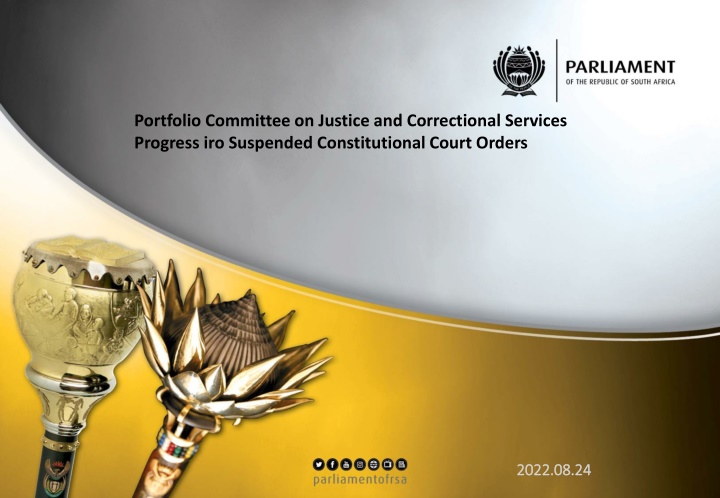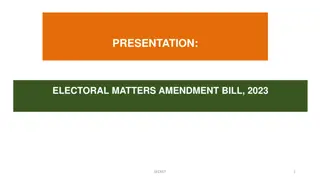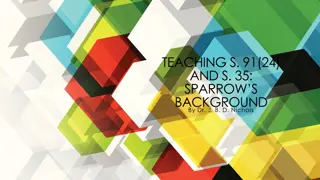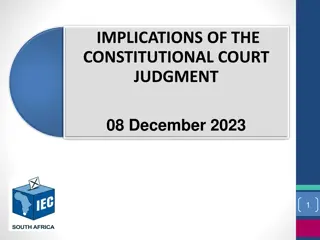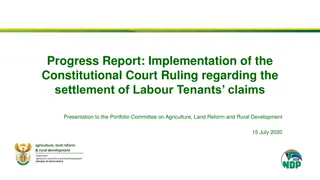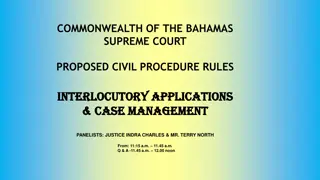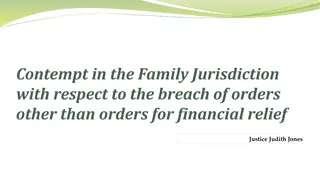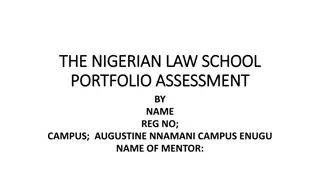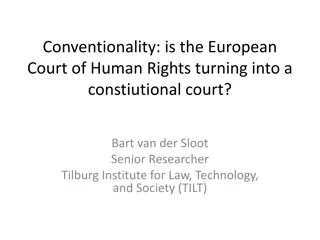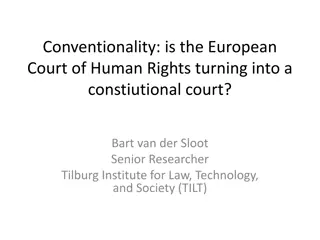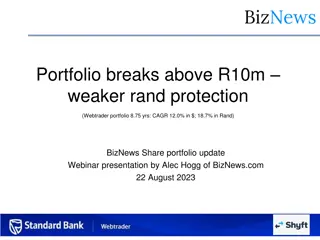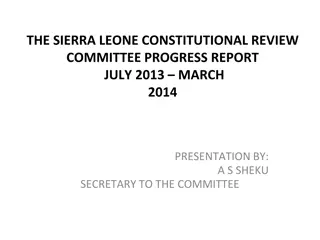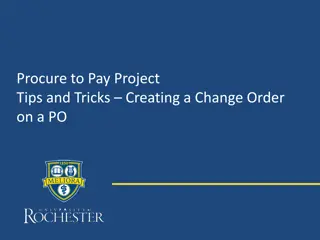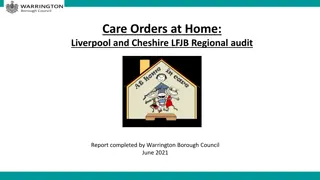Progress Report on Suspended Constitutional Court Orders - Portfolio Committee Update
Progress report on suspended Constitutional Court orders related to various cases such as Minister of Justice and Constitutional Development v. Prince, Sonke Gender Justice NPC v. President of South Africa, and more. Updates on bills, amendments, and plans presented by the Portfolio Committee on Justice and Correctional Services. Key points include the introduction of the Cannabis for Private Purposes Bill, the consideration of the Conspiracy and Inducement to Commit Serious Offence Bill, and the briefing on Correctional Services Act amendments. The Department is actively working towards addressing legal gaps as per Constitutional Court rulings.
Download Presentation

Please find below an Image/Link to download the presentation.
The content on the website is provided AS IS for your information and personal use only. It may not be sold, licensed, or shared on other websites without obtaining consent from the author.If you encounter any issues during the download, it is possible that the publisher has removed the file from their server.
You are allowed to download the files provided on this website for personal or commercial use, subject to the condition that they are used lawfully. All files are the property of their respective owners.
The content on the website is provided AS IS for your information and personal use only. It may not be sold, licensed, or shared on other websites without obtaining consent from the author.
E N D
Presentation Transcript
Portfolio Committee on Justice and Correctional Services Progress iro Suspended Constitutional Court Orders 2022.08.24 2022.08.24
Overview 1. Progress on suspended Constitutional Court Orders (4 slides) 2. Recent judgments impacting on role of Parliament 3. Committee Bills 2
Progress on suspended Constitutional Court Orders Minister of Justice and Constitutional Development and Others v Prince; National Director of Public Prosecutions and Others v Rubin; National Director of Public Prosecutions and Others v Acton and Others [2018] ZACC 30 (18 September 2018) Drugs and Drug Trafficking Act, 1992 (Act No. 140 of 1992), ss 4(b) and 5(b) read with Part III of Schedule 2 Suspension of the order lapsed 17 September 2020. A read in provision is provided in the interim and will continue to apply should the defect not be corrected by the above date no gap in the law Progress: The Cannabis for Private Purposes Bill [B19-2020] was introduced on 2020.09.01 and is being considered by the Portfolio Committee on Justice and Correctional Services. The Portfolio Committee on Justice is deliberating on proposed amendments to the Bill. Economic Freedom Fighters and Another v Minister of Justice and Correctional Services and Another [2020] ZACC 25 (27 November 2020) Riotous Assemblies Act, 1956 (Act No. 17 of 1956) Suspension of the order lapses 26 November 2022 - A read in provision was provided, and will apply during the suspension period as well as after the suspension has lapsed. There is thus no gap in the law. Progress: The Department confirmed that a draft Bill (Conspiracy and Inducement to Commit Serious Offence Bill), which will address the issues in the EFF judgment has been finalised, with inputs from the National Prosecution Authority and the South African Police Services. The Department is engaged in processing the Bill through to Cabinet to obtain approval to introduce the Bill into Parliament. The Bill has been placed on the draft Legislative Programme for the Department for 2022. 3
Progress on suspended Constitutional Court Orders Sonke Gender Justice NPC v President of the Republic of South Africa and Others [2020] ZACC 26 (4 December 2020) Correctional Services Act 111 of 1998 Suspension of the order lapses 3 December 2022 - No read in provision, nor measure to apply during the suspension or thereafter was provided. Progress: The Department briefed the Portfolio Committee on progress on the relevant Bill in June 2022. The Department is planning to present the draft Bill to the JCPS Security Cluster on 18 August and to Cabinet on 23 August. They estimate briefing the Portfolio Committee early September 2022. If introduced in September, the programming of this Bill will require careful planning and possibly prioritisation in order to pass this Bill in time for the President to assent by 3 December 2022. Our Office has alerted the Chairperson of the Portfolio to this and has offered other options related to dealing with this matter by way of a Committee Bill (also see slides 7 and 8) Smit v Minister of Justice and Correctional Services and Others [2020] ZACC 29 (18 Dec 2020) Drugs and Drug Trafficking Act 140 of 1992 section 63 + amendments to Schedules 1 and 2. Suspension of the order lapses 17 December 2022 - No read in provision, nor measure to apply during the suspension or thereafter was provided. Progress: 31 May 2022: The Department confirmed that a draft Drug and Drug Trafficking Amendment Bill and a draft Extradition Bill have been finalised. The Department is processing the Bills through the established structures in order to obtain Cabinet approval for the introduction of the Bills into Parliament. The Bills have been placed on the draft Legislative Programme for the Department for 2022. 4
Progress on suspended Constitutional Court Orders Bwanya v Master of the High Court, Cape Town and Others [2021] ZACC 51 (31 December 2021) Maintenance of Surviving Spouses Act 27 of 1990 and Intestate Succession Act 81 of 1987. Suspension of the order lapses 29 June 2023 - Read in provisions will come into operation if the defect is not corrected by 29 June 2023 No gap in the law. Progress: 31 May 2022: The Department confirmed that it has incorporated the amendments to section 1 of the Maintenance of Surviving Spouses Act, 1990 and section 1(1) of the Intestate Succession Act, 1987 into the Judicial Matters Amendment Bill, which the Department has prepared and which is awaiting internal processing. The Department is targeting July 2022 for introduction. The Bill has been placed on the draft Legislative Programme for the Department for 2022. Qwelane v South African Human Rights Commission and Another [2021] ZACC 22 (30 July 2021) Promotion of Equality and Prevention of Unfair Discrimination Act 4 of 2000. Suspension of the order lapses 29 July 2023 - A read in provision was provided, and will apply during the suspension period as well as after the suspension had lapsed. There is thus no gap in the law Progress: 31 May 2022: The Department confirmed that the Promotion of Equality and Prevention of Unfair Discrimination Amendment Bill, which has already been developed by the Department will be amended to incorporate the required amendments to section 10 as per the Qwelane judgment. The Department is currently processing the comments received from the public and has scheduled a meeting with stakeholders who made substantive comments. A workshop is planned in early June 2022. Thereafter, the Bill will be processed for Cabinet approval to introduce the Bill in Parliament. The Bill has been placed on the draft Legislative Programme for the Department for 2022. 5
Progress on suspended Constitutional Court Orders AmaBhungane Centre for Investigative Journalism NPC and Another v Minister of Justice and Correctional Services and Others; Minister of Police v AmaBhungane Centre for Investigative Journalism NPC and Others [2021] ZACC 3 Regulation of Interception of Communications and Provision of Communication Related Information Act 70 of 2002. Suspension of the order lapses 3 February 2024 - A read in is provided, but only during the period of suspension. Progress: 31 May 2022: The Department confirmed that a draft Bill to address the issues raised in the judgment, is being drafted and will soon be consulted on with key stakeholders. The Bill has been placed on the draft Legislative Programme for the Department for 2022. Women s Legal Centre Trust v President of the Republic of SA and Others [2022] ZACC 23 (28 June 2022) Divorce Act 70 of 1979. Suspension of the order lapses 27 June 2024 - A measure to apply during the period of suspension was provided. Progress: The Portfolio Committee was advised (written opinion); Correspondence sent to the Department of Justice; The Department has taken a decision in May 2022 to ensure that all the Bills with Constitutional Court deadlines are submitted to Parliament within the time allowed (i.e. targeting introduction June 2023) 6
Recent judgments impacting on role of Parliament Recent judgments impacting on role of Parliament New Nation Movement NPC v President of RSA - extension judgment [62] Parliament awaited the Minister s introduction of the Bill. When it was so long delayed, Parliament should have taken steps to introduce a bill, without reliance on the Minister. This it failed to do. However, I do note the steps taken by Parliament to comply with the order. Although the order was directed to Parliament to cure the unconstitutionality of the Electoral Act, one cannot ignore the belated proposals by the Minister which evidently added to the delay. However, Parliament should have done more. Having recognised the delay caused by the Minister, Parliament could have, and indeed should have, introduced the Bill itself. And specifically [63] However, Parliament still attempts to escape accountability by alleging that it did not introduce the Bill because it was waiting for the Minister to do so. Compliance with this Court s order rests with Parliament. If the Minister is dilatory, Parliament will not be excused from its duty to meet the deadlines imposed by a court order. Women s Legal Centre Trust v President of the Republic of South Africa and Others [2022] ZACC 23 With reference to the SCA judgment: [25] On the first issue, the Court held that Parliament has the responsibility to make laws; the President and Cabinet merely have a discretionary power to prepare and initiate legislation. Therefore, ordering the state to enact legislation on the basis of section 7(2) alone would be an infringement of the separation of powers doctrine. The Supreme Court of Appeal held that section 85 of the Constitution vests the executive authority with the power to prepare and initiate legislation. Sections 43 and 44 make it plain that the national legislative authority is exclusively in the hands of Parliament. 7
Committee Bills NAR 273 to 275 Committee adopts and tables a memorandum setting out the particulars and objects of the proposed Bill; whether it has financial implications; and the views of the Executive on the proposed Bill. The Committee must thus develop a policy that will inform the Bill, before the Bill can be developed. Sources to develop a policy: Department; Constitutional Court read in; Content Adviser / Researcher develop a policy in accordance with Committee discussions. Once the Assembly has approved the memorandum, the Committee develops a Bill. Legal Services has the capacity to assist a Committee in this regard. Draft 1 Consult JTM on classification (and NHTKL if applicable); Report on the Bill to the House; Advertise intention to introduce and call for comments (public involvement); Interested persons must be given at least three weeks after publication to comment. Relevant Department / Organ of State must be given sufficient opportunity to make submissions to the Committee. Deliberations, amendments, further consultations etc. until the Committee is satisfied that the draft can be introduced: The Committee adopts the Bill and a report that speaks to the Bill; The Committee again consults the JTM on the classification of that Bill; The findings of the JTM as per NA Rule 275(c) are tabled with the Bill when it is introduced. Legal Service certifies the Bill as per the NAR. The Committee introduces the Bill by submitting a copy thereof and a supporting memorandum to the Speaker. Bill has a second reading and is transferred to the second House. Takes on average 19-40 weeks (4 to 8 months) in the first House to develop the Bill (i.e. not including policy development) 8
